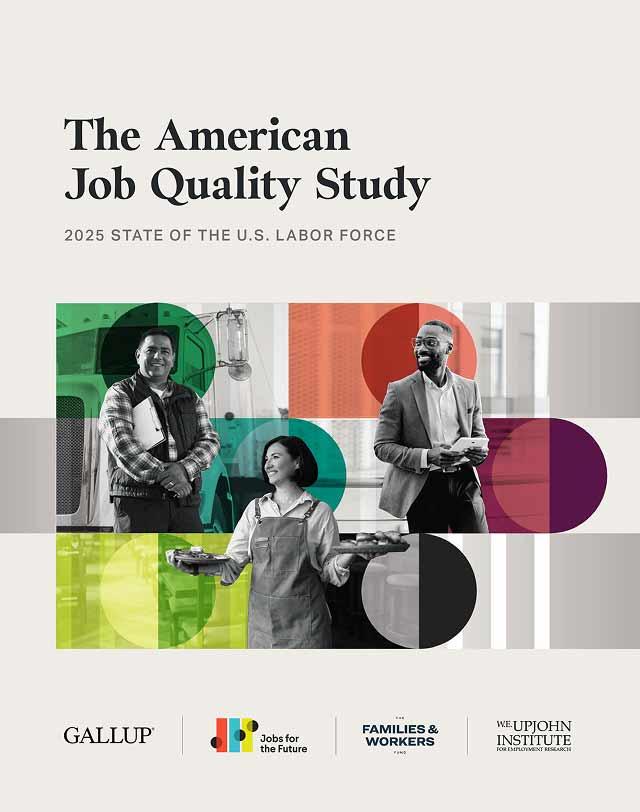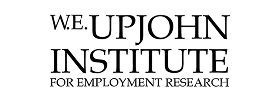![American Quality Hub > Top Card > 2025 State of the U.S. Labor Force > 2025-10 [UPDATE]](https://imagekit.gallup.com/fusion/tr:n-emd_tmpl_dlp_bg_lg/ANALYTICSV9CMS/8b577864-8452-49d8-a242-24beba41d152.jpg)
The American Job Quality Study: 2025 State of the U.S. Labor Force
Led by Jobs for the Future, The Families & Workers Fund, the W.E. Upjohn Institute for Employment Research and Gallup, the American Job Quality Study (AJQS) provides a data-driven picture of how U.S. jobs are working for people, businesses and communities.
The American Job Quality Study
The way we work is changing — but the way we measure it hasn’t kept up.
Traditional labor statistics tell us how many people are employed and how much they earn. But these numbers tell only part of the story. They miss whether jobs actually allow workers — and businesses — to thrive.
The AJQS, led by Jobs for the Future, The Families & Workers Fund, the W.E. Upjohn Institute for Employment Research and Gallup, provides a deeper, data-driven look at the real story of work in America today.
The first report in the study is based on a survey of more than 18,000 U.S. workers across industries, demographics and employment types, establishing a national benchmark for job quality and laying the groundwork for future reports. The findings show that only 40% of U.S. workers hold “quality jobs” — those offering fair pay and benefits, safe and respectful workplaces, opportunities for growth, a voice in decisions and sustainable schedules. Quality jobs are linked to higher satisfaction and wellbeing, yet most U.S. workers face gaps in pay, advancement, scheduling and fairness. These results offer leaders a data-driven baseline to improve job quality across America.

What Makes This Study Different

Unprecedented Scale
A nationally representative study of more than 18,000 workers surveyed across job types, industries, regions and demographics.

Multidimensional View
Goes far beyond wages or job satisfaction to explore how job quality elements interact — compounding or offsetting one another — and impact worker success.

Better Worker Representation
Includes part-time and non-W-2 workers often excluded from national labor surveys.
Why Job Quality Matters Now
Workplace norms and worker expectations have shifted dramatically. Today’s labor market is shaped by new economic realities, evolving technologies and changing values.
Yet we’re still relying on outdated metrics to define success.
This study comes at a critical time — offering fresh insights into how job quality affects workers’ wellbeing, job satisfaction, health, work-life balance and personal financial situation, which all tie to burnout and turnover and ultimately affect U.S. economic competitiveness. It’s a call to leaders across public and private sectors: If we want a strong and stable workforce, we have to start by understanding what workers need to thrive at work.
The Five Dimensions of Job Quality
Our research highlights five core dimensions that shape how workers experience their jobs. These dimensions were developed in partnership with leading economists and job quality experts. They build on decades of research on what workers need to thrive at work and in life.
-
01. Financial WellbeingFair pay, stable employment and benefits that meet basic needs and reduce financial stress.
-
02. Workplace Culture and SafetyA safe, respectful environment free from discrimination or harassment.
-
03. Growth and Development OpportunitiesA clear path to build skills, gain experience and advance in one’s career.
-
04. Agency and VoiceInfluence over decisions that shape one’s job, such as pay, working conditions and implementation of technology.
-
05. Work Structure and AutonomyA stable, predictable schedule, a manageable workload, and meaningful control over when and how work gets done.
Acknowledgments
Gallup acknowledges the invaluable contributions of numerous partners and stakeholders whose support and collaboration have been instrumental in the development of the survey and report.
Partnering/Contributing Organizations





Research Task Force
We offer special thanks to our research task force — some of the nation's top experts on job quality who helped design this study and ensure rigorous, relevant insights.
- Katharine G. Abraham, Distinguished University Professor of Economics, University of Maryland
- Chandra Childers, Senior Policy and Economic Analyst, Economic Policy Institute
- Erica L. Groshen, Senior Economics Advisor, Cornell University School of Industrial and Labor Relations, and Research Fellow, W.E. Upjohn Institute for Employment Research
- Alexander Hertel-Fernandez, Herbert Lehman Professor of Government, Columbia University
- Susan Houseman, Senior Economist, W.E. Upjohn Institute for Employment Research
- Erin L. Kelly, Sloan Distinguished Professor of Work and Organization Studies, MIT Sloan School of Management, and Co-Director, MIT Institute for Work and Employment Research
- Thomas A. Kochan, George M. Bunker Professor Emeritus, MIT Sloan School of Management and MIT Institute for Work and Employment Research
- Susan J. Lambert, Professor Emerita, Crown Family School of Social Work, Policy, and Practice, University of Chicago
- Camille Lloyd, Director, Gallup Center on Black Voices
- Beth C. Truesdale, Research Fellow, W.E. Upjohn Institute for Employment Research
Subscribe to Our Research
Sign up to receive email updates about our latest global analytics work, including insights from our survey research and polling around the world.


